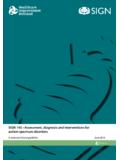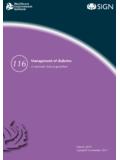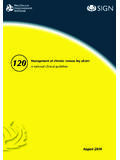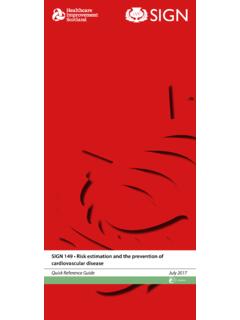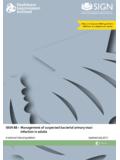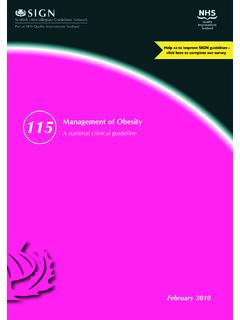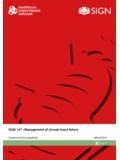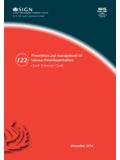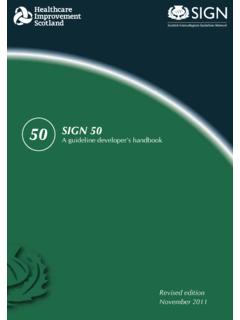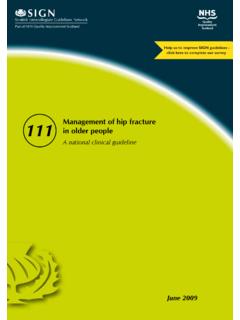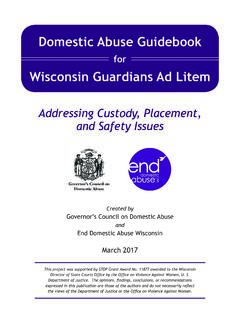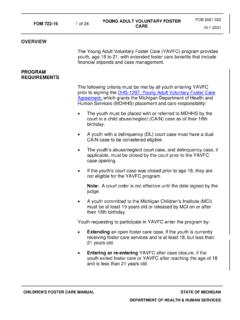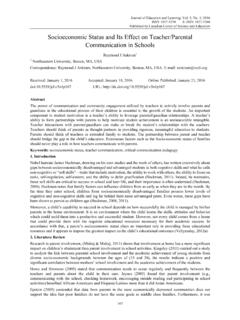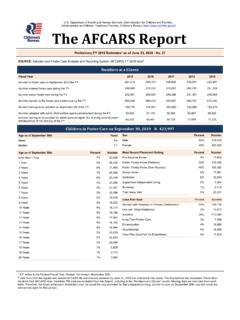Transcription of Fetal Alcohol Spectrum Disorder (FASD)
1 Fetal Alcohol Spectrum Disorder (FASD). A booklet for parents, carers and families of children and young people exposed to Alcohol during pregnancy Living skills age 11. Physical age 18. Reading ability age 16. Communication and social Social maturity skills age 6. age 7. Expressive language age 20 Money and time concepts age 8. Acknowledgements We would like to thank all the parents, kinship carers and young people who helped develop this booklet by sharing their experiences. Thanks also to the voluntary organisations who contributed to this booklet. Cover image illustrates the developmental stages of an 18-year-old with FASD. This is an example profile and every child is different.
2 Scottish Intercollegiate Guidelines Network ISBN 978-1-909103-72-6. First published 2019. This document is licensed under the Creative Commons Attribution- Noncommercial-NoDerivatives International Licence. This allows for the copy and redistribution of this document as long as SIGN is fully acknowledged and given credit. The material must not be remixed, transformed or built upon in any way. To view a copy of this licence, visit Contents Who is this booklet for? 2. What is this booklet about? 3. What is FASD? 5. How common is FASD? 8. What are the signs of possible FASD? 9. Worried your child may have FASD? 12. What should I do if I'm concerned? 13. What information should I share with my 14.
3 GP or health visitor? How will I be prepared for the assessment? 17. What information will the assessment team need? 17. How are children and young people assessed? 18. Gathering information about your child 19. Who does the assessment? 20. What will happen at the assessment? 21. What will happen after the assessment? 23. Getting the assessment results 25. What can help? 27. Understanding FASD 27. Strategies that can help 28. Will I be put in touch with services that can help? 34. What happens as my child gets older? 36. Where can I find out more? 38. List of useful terms 45. How are SIGN guidelines produced? 47. Who is this booklet for? This booklet is for parents, carers and families of children and young people up to the age of 18 who: are affected by Alcohol in pregnancy may be going through assessment m ay be described as having Fetal Alcohol Spectrum Disorder (FASD).
4 Anyone in touch with your child may find it helpful too. It can help them to understand and support your child. Throughout the booklet, parent' refers to people who live with the child and are the main carers. This includes foster parents and legal guardians. Child' refers to children and young people up to age 18. Details of support organisations and other places where you can find out more are on pages 38 46. 2. What is this booklet about? This booklet explains the recommendations in a clinical guideline, produced by the Scottish Intercollegiate Guidelines Network (SIGN), about: identifying children who are at risk of FASD. a ssessing children and young people who have been exposed to Alcohol before they were born, and s upporting and following up children and young people who may have FASD.
5 This is the first UK guideline for this condition. For many years, it has been known that drinking Alcohol in pregnancy can harm the unborn baby, but the condition remains poorly understood for several reasons: N. ot knowing how children may be referred for professional help and which service to refer them to. D. ifficulty accessing the recommended standardised assessment process. Lack of training on FASD for professionals. The professionals in Scotland involved with your child should now be following this guideline. 3. What is this booklet about? continued The clinical guideline was published in 2019. It is based on what we know from current research. Some parts of the clinical guideline were adapted from the Canadian guideline for diagnosing FASD.
6 The Canadian guideline also gives advice based on the opinion of professionals who have experience of identifying and assessing children and young people who have been exposed to Alcohol during pregnancy. The full SIGN guideline is available on our website On page 47 you can find out more about us at SIGN and how we produce guidelines. There are two types of recommendations in this booklet: Recommendation Recommendation . based on the research based on clinical evidence experience 4. What is FASD? Fetal Alcohol Spectrum Disorder (FASD) refers to the lifelong effects caused when an unborn baby is exposed to Alcohol . When a pregnant woman drinks Alcohol , the Alcohol in her blood passes through the placenta into the developing baby.
7 The baby can't process Alcohol as well as the mother can, which means it can limit the growth of brain cells and damage the baby's central nervous system (or CNS) and other organs. How Alcohol in pregnancy can affect the developing baby Stages of Fetal development Major abnormalities Functional defects and minor abnormalities 1 MONTH 2 MONTHS 3 MONTHS 4 MONTHS 5 MONTHS 6 MONTHS 7 MONTHS 8 MONTHS 9 MONTHS. WEEKS 1 2 3 4 5 6 7 8 9 10 11 12 13 14 15 16 17 18 19 20 21 22 23 24 25 26 27 28 29 30 31 32 33 34 35 36 37 38. Brain and spinal cord Heart Arms Eyes Legs Teeth Palate (roof of mouth). External genitals Ear This illustration has been adapted from Fetal -development-10766134. 5. What is FASD?
8 Continued There is no way of being certain how Alcohol might affect an individual unborn baby. The only sure way of avoiding harm is to follow the Chief Medical Officer's recommendation, which is No Alcohol , No Risk. FASD is a hidden lifelong condition that can affect physical health, social skills, communication skills, memory and behaviour. However, with the right support, people living with FASD can achieve things in life. Differences in the brain and central nervous system may be the underlying reason for difficult behaviours in children and teenagers. To understand the difficulties your child is having, their skills and abilities shown on page 7 will be considered during the assessment process for FASD.
9 You can find out more about the assessment process on page 18. 6. What is FASD? continued There are ten areas of assessment Academic achievement Brain structure and May have difficulty with Attention functioning reading and maths in May be easily May have a small head school distracted or have or brain, or a history difficulty paying of epilepsy attention in class Adaptive behaviour, Thinking and social skills and social reasoning (cognition). communication May have difficulty May have difficulty reasoning or getting on with others understanding complex the same age or with ideas teachers Language Motor skills May have difficulty May have difficulty with understanding co-ordination and balance conversations or or gripping a pencil instructions.
10 Language development may also be delayed Skills involved in organising and controlling thoughts Memory and behaviours May have (executive functioning) Ability to manage difficulty selecting May have difficulty emotions (known as and organising planning, organising and affect regulation ) information when problem solving May have difficulty needed coping well with emotions This illustration has been adapted from a diagram in Every Day is an Adventure: What Parents and Caregivers Need to Know About FASD , Healthy Child Manitoba. 7. What is FASD? continued How common is FASD? It is estimated that at least 3 in every 100 babies born in the UK. are affected by FASD. Some professionals are still learning about the condition.
